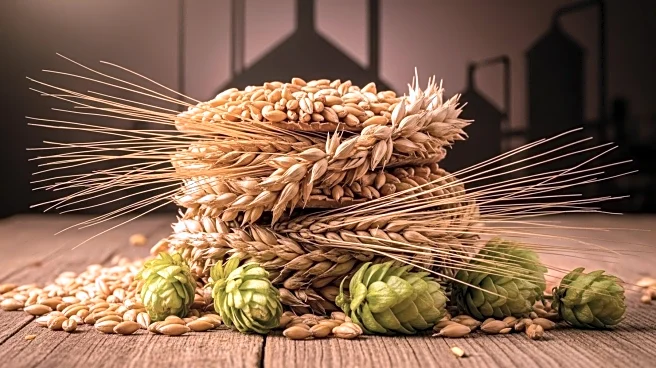What's Happening?
Recent research from the University of Illinois Urbana-Champaign highlights the potential impact of tariffs on the U.S. beer market, valued at $117 billion. The study, co-authored by Aaron Staples and Michael McCullough, examines how tariffs could reshape market dynamics by increasing production costs for both domestic and imported beers. Tariffs on inputs like malt, hops, steel, and aluminum could lead to higher production costs, which may be passed on to consumers. The research indicates that while tariffs might boost domestic production, the benefits would likely favor multinational firms over small craft breweries. The study also notes that tariffs could lead to higher retail prices for imported beers, particularly those from Mexico, which accounts for a significant portion of U.S. beer imports.
Why It's Important?
The implications of tariffs on the beer industry are significant, affecting consumer prices and market competition. Higher production costs could lead to increased beer prices, reducing consumer welfare by an estimated $53.1 million to $306.4 million. Small craft breweries, which are integral to local economies, may struggle to compete with larger multinational firms that can better absorb cost increases. This shift could reduce product variety and impact local economic growth. Additionally, the study suggests that multinational firms might capitalize on nationalistic marketing strategies, further altering consumer preferences and market shares.
What's Next?
The ongoing tariff situation remains fluid, with potential legal challenges to certain tariffs. If tariffs persist, consumers may face sustained higher prices, and small craft breweries could experience financial strain. Multinational firms might continue to adapt their strategies, investing in domestic production and marketing their products as 'American made.' The long-term effects on local economies and consumer choices will depend on how the industry navigates these challenges and whether tariffs are adjusted or repealed.
Beyond the Headlines
The broader implications of tariffs extend beyond immediate price increases. They could lead to a consolidation of market power among multinational firms, reducing competition and innovation in the beer industry. This shift might also influence cultural aspects of beer consumption, as local craft breweries often contribute to community identity and local traditions. The legal and ethical dimensions of tariff policies could spark debates on trade practices and their impact on domestic industries.










